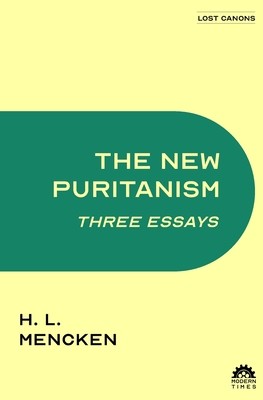
- We will send in 10–14 business days.
- Publisher: Modern Times Publishing
- ISBN-10: 1632923270
- ISBN-13: 9781632923271
- Format: 13.3 x 20.3 x 0.6 cm, minkšti viršeliai
- Language: English
- SAVE -10% with code: EXTRA
The New Puritanism (e-book) (used book) | bookbook.eu
Reviews
Description
Nothing in H. L. Mencken's long career-during which he authored over thirty books, edited two national magazines, and regularly published a column in The Baltimore Sun -ignited his wrath as much as the sense that the complexity of American life was constricted by the spirit of puritanism. His notion of puritanism had little to do with the religious creed, and much more to do with a moral righteousness that he seemed to encounter at the base of American society. The New Puritanism, his three main essays on the topic appear together for the first time, makes possible a reconsideration of his subtle argument for a society that looks beyond the simplistic constructs of good and evil-fostering tolerance and inclusivity towards imperfection.
Henry Louis Mencken (1880-1956) was an author and editor whose reputation preceded him-not always positively. He courted controversy at every turn and projected a confidence that was often interpreted as elitism. The son of a self-made cigar magnate, he was an autodidact with a nose for talent and trouble. Mencken never suppressed an opinion or spared a colleague, yet as co-editor of The Smart Set and the American Mercury he gave more writers their first chance than most gatekeepers of his time. He was a champion of literary quality, as well as the need for a dynamic democracy. When his Diary was published posthumously, revealing racist comments that led to renewed dismay, a number of writers-including Ralph Ellison, Arthur Miller, and Kurt Vonnegut-came to his defense, noting that "no white editor of the day did more to seek out and encourage black writers" and "no editor did more to fight for freedom of expression for all Americans."- Publisher: Modern Times Publishing
- ISBN-10: 1632923270
- ISBN-13: 9781632923271
- Format: 13.3 x 20.3 x 0.6 cm, minkšti viršeliai
- Language: English English
Nothing in H. L. Mencken's long career-during which he authored over thirty books, edited two national magazines, and regularly published a column in The Baltimore Sun -ignited his wrath as much as the sense that the complexity of American life was constricted by the spirit of puritanism. His notion of puritanism had little to do with the religious creed, and much more to do with a moral righteousness that he seemed to encounter at the base of American society. The New Puritanism, his three main essays on the topic appear together for the first time, makes possible a reconsideration of his subtle argument for a society that looks beyond the simplistic constructs of good and evil-fostering tolerance and inclusivity towards imperfection.
Henry Louis Mencken (1880-1956) was an author and editor whose reputation preceded him-not always positively. He courted controversy at every turn and projected a confidence that was often interpreted as elitism. The son of a self-made cigar magnate, he was an autodidact with a nose for talent and trouble. Mencken never suppressed an opinion or spared a colleague, yet as co-editor of The Smart Set and the American Mercury he gave more writers their first chance than most gatekeepers of his time. He was a champion of literary quality, as well as the need for a dynamic democracy. When his Diary was published posthumously, revealing racist comments that led to renewed dismay, a number of writers-including Ralph Ellison, Arthur Miller, and Kurt Vonnegut-came to his defense, noting that "no white editor of the day did more to seek out and encourage black writers" and "no editor did more to fight for freedom of expression for all Americans."

Reviews